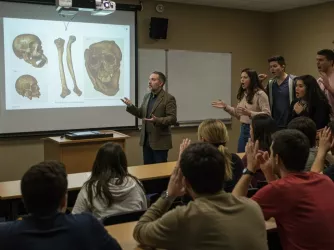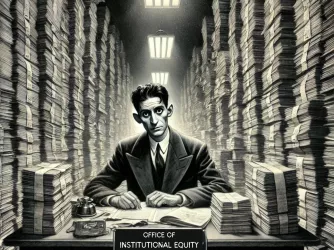Table of Contents
Cal State vs. the Constitution
There seems to be a real case of Peter Harveyism developing out at California State University–San Bernardino (CSUSB). What is “Peter Harveyism,” you ask? You’re looking at a case of Peter Harveyism when a state official cites state regulations in order to defend an incoherent and unconstitutional policy.
Peter Harvey, the attorney general of New Jersey, became infamous within FIRE when his office sent us a letter defending William Paterson University’s persecution of student employee Jihad Daniel for “harassment” because he sent a private e-mail expressing his religious opinion of homosexuality in response to an unsolicited e-mail advertising the showing of a movie about a lesbian relationship. (Thanks to FIRE, Daniel was eventually cleared of the charge.) Harvey’s office told FIRE, “Clearly, speech which violates a non-discrimination policy is not protected” under the Constitution—an extremely frightening thing for a state official to say, considering that the policy unconstitutionally prohibited “derogatory or demeaning” speech to members of protected groups. Not coincidentally, this also elevated state regulations—over which attorneys general have significant influence—above the Constitution. This was not what you would call a bold stand for liberty.
It’s safe to say, then, that Albert Karnig, president of CSUSB, suffers from this same condition. Last month, FIRE announced that CSUSB was refusing to recognize a Christian group, the Christian Students Association (CSA), because it would not include religion or sexual orientation in the otherwise robust nondiscrimination clause in its constitution. CSUSB demanded that the group not reject members because of their “status” as a non-Christian or homosexual, although it said that it could reject members whose beliefs did not fit with those of the group. As FIRE Interim President Greg Lukianoff said, “CSA is not discriminating based on students’ status, but trying to express its religious faith and adhere to its beliefs regarding sexual morality. As FIRE has pointed out so many times, student groups at public universities have a right to ensure that their members share their central beliefs.” Not only would admitting people who did not share their beliefs interfere with the group’s message of religion and sexual morality, but to say that the “status” of being Christian is different from Christian “belief” is incoherent.
Several e-mailers pointed this out to CSUSB President Karnig, who had a ready answer. He explained in a response that “Title 5 of the California Code of Regulations states, ‘No campus shall recognize any fraternity, sorority, living group honor society, or other student organization which discriminates on the basis of race, religion, natural origin, ethnicity, color, age, gender, marital status, citizenship, sexual orientation or disability.’” It further requires that club officers sign a statement “attesting that the organization has no rules or policies which discriminate on the basis of race, religion, national origin, ethnicity, color, age, gender, marital status, citizenship, sexual orientation, or disability” and denies state or university support to organizations that don’t meet that requirement. And just in case you had any doubts about his politics, Karnig went on to gleefully send along a local editorial calling the students “another group catering to the born-again Christian, anti-homosexual agenda” and pointing out that the group’s leader “occupies his free time compiling a ‘watch list’ of liberal professors and organizing affirmative-action bake sales as president of another student group, the College Republicans.” Oh, the horror. Karnig said in a later e-mail that the regulations left him and CSUSB with “no discretion” about rejecting the group’s recognition.
That elevation of arbitrary state regulations over the Constitution is Peter Harveyism. The truth is that public officials—state, local, federal, and otherwise—have not just the discretion but the duty to uphold the U.S. Constitution at all times, even in the face of countervailing state regulations. The First Amendment guarantees the right to freedom of religion and freedom of association—both of which are compromised by the California regulations. While the state itself may not discriminate on the basis of religion (and, in many states, sexual orientation), the Christian Students Association is not the state, and must be treated equally with secular groups when it comes to things like official recognition as a university group.
There is an extremely good reason for this. As we explained in our letter to UNC Chapel Hill in a very similar case, the U.S. Supreme Court pointed out in Boy Scouts of America v. Dale (2000) that “implicit in the right to engage in activities protected by the First Amendment is a corresponding right to associate with others in pursuit of a wide variety of political, social, economic, educational, religious, and cultural ends.” The Court called this right “crucial in preventing the majority from imposing its views on groups that would rather express other, perhaps unpopular, ideas.” Consequently, the Court held that “forced inclusion of an unwanted person infringes the group’s freedom of expressive association if the presence of that person affects in a significant way the group’s ability to advocate public or private viewpoints.” The very purpose of CSA was to communicate the group’s messages of religious belief and sexual morality. California’s regulations, on the other hand, actually force the leaders of such a group to sign a statement swearing fealty to the state’s official approved beliefs. This is incompatible with a free society, and is simply not consistent with the First Amendment’s guarantees of fundamental liberties.
It’s hard to believe that President Karnig doesn’t know this—after all, the Cal State system is being sued on these very grounds. So why doesn’t he fulfill his responsibilities as a public official and uphold the higher law of the Constitution? Simply put, it’s easier not to. Not only does he appear to agree that these Christian students should not have full rights of association and expression, but it’s always easier to hide behind regulations instead of doing the right thing. After all, university administrators are state bureaucrats, and if there is one thing bureaucrats are not known for doing, it’s rocking the boat. The next public university president that FIRE sees being fired for not upholding the rights of Christian students will be the first; frankly, it’s a low-risk thing to do. But that doesn’t mean it’s the right thing to do. FIRE hopes that President Karnig, UNC Chapel Hill President James Moeser, Attorney General Harvey and the countless other officials who ignore the First Amendment because it’s easier to do so will find the courage one day to live up to the public’s trust in them.
Recent Articles
FIRE’s award-winning Newsdesk covers the free speech news you need to stay informed.

UPDATE: Another federal appeals court backs academic free speech for public employees

Feds to Columbia: ‘You want $400 million in contracts back? Do this (or else)’

A picture is worth a thousand words — unless a college district bans it
